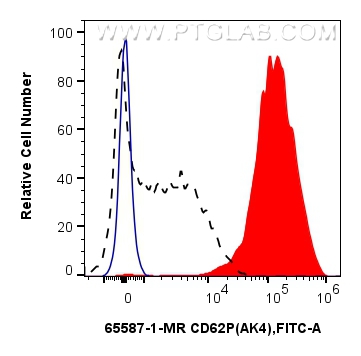验证数据展示
经过测试的应用
| Positive FC detected in | Thrombin treated human peripheral blood platelets |
推荐稀释比
| 应用 | 推荐稀释比 |
|---|---|
| Flow Cytometry (FC) | FC : 0.25 ug per 10^6 cells in 100 μl suspension |
| This reagent has been tested for flow cytometric analysis. It is recommended that this reagent should be titrated in each testing system to obtain optimal results. | |
| Sample-dependent, Check data in validation data gallery. | |
产品信息
65587-1-MR targets CD62P in FC applications and shows reactivity with Human samples.
| 经测试应用 | FC Application Description |
| 经测试反应性 | Human |
| 免疫原 |
Human platelets 种属同源性预测 |
| 宿主/亚型 | Mouse / IgG2a |
| 抗体类别 | Recombinant |
| 产品类型 | Antibody |
| 全称 | selectin P (granule membrane protein 140kDa, antigen CD62) |
| 别名 | CD62, CD62P, FLJ45155, GMP 140, GMP140, GMRP, Granule membrane protein 140, GRMP, LECAM3, P selectin, PADGEM, PSEL, SELP |
| 计算分子量 | 830 aa, 91 kDa |
| GenBank蛋白编号 | BC028067 |
| 基因名称 | CD62P |
| Gene ID (NCBI) | 6403 |
| RRID | AB_3670337 |
| 偶联类型 | Unconjugated |
| 形式 | Liquid |
| 纯化方式 | Protein A purification |
| UNIPROT ID | P16109 |
| 储存缓冲液 | PBS with 0.09% sodium azide, pH 7.3. |
| 储存条件 | Store at 2-8°C. Stable for one year after shipment. |
背景介绍
P-selectin, also known as GMP140 or CD62P, is a transmembrane glycoprotein that mediates the interaction of activated endothelial cells or platelets with leukocytes. It is an adhesion molecule involved in the pathogenesis of inflammation, thrombosis, and oncogenesis. P-selectin is stored in the alpha-granules of platelets and Weibel-Palade bodies of endothelial cells. Upon cell activation by agonists, P-selectin is transported rapidly to the cell surface.
实验方案
| Product Specific Protocols | |
|---|---|
| FC protocol for CD62P antibody 65587-1-MR | Download protocol |
| Standard Protocols | |
|---|---|
| Click here to view our Standard Protocols |


